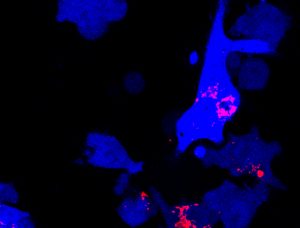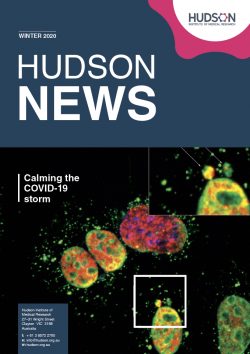Severe COVID-19 infection presents as excessive lung inflammation, involving the build-up of cells and fluid in the lungs. This phenomenon, known as ARDS, restricts breathing and causes damage to the lungs. Severely affected patients will need ventilator assistance in intensive care.

COVID-19 has similar characteristics to severe Influenza A virus (IAV) infections, including the damaging lung inflammation that causes ARDS. Associate Professor Ashley Mansell and Dr Michelle Tate are collectively using their knowledge of severe inflammation from IAV studies to repurpose and develop potential drugs to treat COVID-19. The team has been sought out by international biotech companies due to their specialist expertise.
How we are tackling acute inflammation
- Identifying the molecular mechanisms of SARS CoV-2 induced inflammation
- Examining how COVID-19 results in severe lung inflammation
- Developing and testing new, and repurposed, anti-inflammatory compounds to treat ARDS in COVID-19.
Why is research into inflammation caused by infectious diseases needed?
“At the moment there are no effective treatments to address the devastating effect of inflammation caused by COVID-19,” A/Prof Mansell said. “There is a desperate worldwide need to identify and develop new therapies as quickly as possible.”
Dr Michelle Tate added, “Inflammation is involved in nearly every disease known to humankind and yet we understand very little of how, why and where this occurs and what causes it. If we understand the how and why, we can try and target it to reduce disease.”
COVID-19 MAY NOT BE OUR BIGGEST WORRY
There’s still the threat of an avian influenza virus emerging which may make COVID-19 look like a bad cough.
The current pandemic highlights several concerning facts
- The world is poorly prepared for new and sudden emerging infectious diseases.
- While vaccines are highly effective, the timeframe to develop, test, make and distribute a new vaccine for an emerging disease like COVID-19 is at least 12-18 months.
- The world currently lacks approved and effective anti-inflammatory drugs to treat emerging inflammatory infectious diseases.
- It is impossible to contain an infectious disease in a global community without strict quarantine measures that severely damage the economy. We have to be prepared with strategies and treatments when pandemics arise. A range of measures is needed to tackle a new virus on the scale of COVID-19 and ‘buy’ time until a vaccine is ready.
A/Prof Ash Mansell
Research Group Head, Pattern Recognition Receptors and Inflammation Research group
Dr Michelle Tate
Research Group Head, Viral and Immunity and Immunopathology Research group
Further funding is needed for this team to pursue research into repurposing existing drugs and for the methods of delivery to patients, including inhalers and nebulisers.

